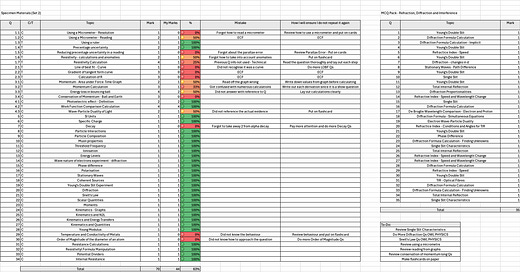The 4-Month Grind: Your Ultimate Game Plan for Exam Season Success
Master Your Revision with a Proven System to Crush Exams and Earn a Stress-Free Summer
Hey everyone,
I hope you’re all doing well.
Apologies for not writing in a while! With the mountain of assignments and A-Levels just four months away, my schedule has been tighter than ever.
But as promised, I’m here to share my golden method for revising in the final months before exams. So, let’s get into it.
Flashcards. Eat. Papers. Repeat.
This “D-Day Revision System” is straightforward but powerful. It focuses on cycling through all topics repeatedly until every mistake is ironed out—setting you up for the best possible grades on exam day.
The Day-by-Day Plan:
1. Morning: Flashcards
Start your day with flashcards. Focus on two key things:
• Content: Parts of the specification you need to memorize.
• Mistakes: Past errors so you don’t make them again (hopefully).
2. School: Use Free Periods Wisely
During free periods, drill exam questions in weaker topics or get homework done. Both are productive, but prioritize practice in areas where you lack confidence.
3. Afternoon/Evening: Timed Exam Papers
At home—or even at school if you can—complete a past paper under timed conditions. This is the core of your preparation.
4. Harsh Marking & Analysis
This step is crucial. Mark your paper harshly and dissect your mistakes. During my GCSEs, I’d jot down weak topics on the front of the paper to revisit later. But for A-Levels, I’m leveling up.
I now use detailed Excel sheets to break down every paper:
• Scores by topic.
• Written explanations of mistakes.
• Clear next steps for improvement.
It’s more time-consuming, but it creates an organized audit of my progress and gives me a visual understanding of what’s working and what isn’t. Time will tell if I stick with it, but so far, I think it’s worth it.
5. Feedback & Targeted Practice
Now it’s time to fix those mistakes. Use the list of weak topics from your exam analysis and spend an hour drilling practice questions specifically on those areas. This is where real progress happens.
6. Repeat. Daily. One Subject a Day.
That’s it. Simple but effective.
On top of this, make sure you:
• Get 30–45 minutes of daily exercise for mental clarity and energy.
• Prioritize 8 hours of sleep for memory and retention.
• Keep a constantly updated RAG (Red, Amber, Green) Topic List for each subject. This helps you track your strengths and weaknesses and guides your revision beyond just past papers.
• Spend quality time with family and friends, but limit social media and outings to stay focused.
For reference, I’m planning to dedicate about 6–8 hours daily to studying for my A-Levels. During my GCSEs, I typically spent 2–4 hours on weekdays and up to 6 hours on weekends.
Why It Works
Yes, it’s intense. You’ll be spending long hours revising — plus homework and extra practice to turn everything on your RAG list green. But it’s only four months. And it’s worth it. Imagine entering that three-month summer break knowing you gave it everything.
So, what will it be?
I might share my weekly routine in a future newsletter, but for now, if you’re convinced, I challenge you to fit this system into your schedule. Start now. The sooner you begin, the faster it’ll stick—and the sooner you’ll see results.
Wishing you the best of luck. Speaking of which, I need to head off and tackle some feedback questions from the physics paper I did today.
Best wishes,
Ismail





Another note! I just finished my feedback time slot. If you still have unfinished to-dos, that’s perfectly fine! :) The feedback slot is dedicated to reviewing and working through the weak areas identified from your test. If you don’t complete them all, they simply carry over to the next day until they’re done.
Excellent advice! I learned quite a bit from this post. Keep it up!!